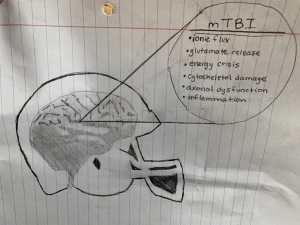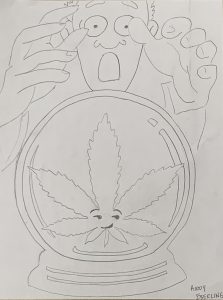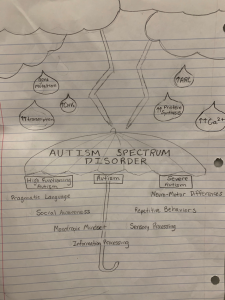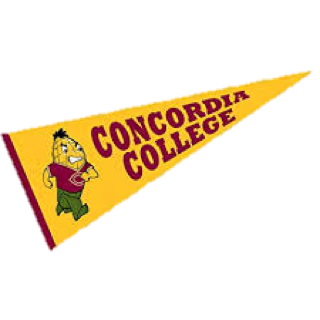I took Neurochemistry kind of as an afterthought. I took it even after I swore to myself I was done with taking chemistry courses after I finished biochemistry in the fall of 2018. But Neurochemistry is different from other chemistry courses, and quickly came to be one of my favorite courses I had taken throughout my years at Concordia. Below I will be giving my Top 10 reasons YOU should take neurochemistry at Concordia. Many of these reasons involve the courses dedication to the goals of liberal learning through the Pivotal Experience in Applied Knowledge (PEAK) program at Concordia College. These goals are:
- Instill a love for learning
- Develop foundational skills and transferable intellectual capacities
- Develop an understanding of disciplinary, interdisciplinary and intercultural perspectives and their connections
- Cultivate an examined cultural, ethical, physical and spiritual self-understanding
- Encourage responsible participation in the world
- NEUROCHEMISTRY IS A PEAK – At Concordia, you need two PEAK’s in order to graduate. Many times it is hard to find a PEAK that directly ties to your major and what you want to do in life. If you are majoring in anything science related, I strongly encourage taking Neurochemistry as one of your PEAKs. Same goes if you are interested in going into a health profession. As a neuroscience major with future plans of attending medical school, I found the topics we covered in class interesting and relevant every week. It made me look forward to waking up every Monday, Wednesday, and Friday even though it was at 8 AM! This course taught me material that I loved to learn
- SMALL CLASS SIZE – Concordia College is known for their small class sizes. It was one of the main reasons why I chose to come to Concordia in the first place. In my Neurochemistry class, there were 16 students and Dr. Mach. This small class size allowed myself to be more comfortable in asking questions, adding input, and discussing with my peers.
- INVOLVEMENT IN THE COMMUNITY – The Community Action Project is a project that relates directly to the goals of the PEAK program. For this project four neurochemistry students, including myself, joined two social work students to address a problem in the community. We addressed mental health in the Fargo-Moorhead area. We reached out to many mental health facilities and found information about anxiety and depression. We made brochures that were distributed addressing common symptoms of anxiety and depression, and how to access the resources available in the community. We discovered the importance of mental health education and the impact this education can have in both the short and long term. The presentation of our work and findings at the end of the year showed the potential impact of mental health education. It encouraged myself and others to continue to responsibly participate in community action.
- STUDENT LED DISCUSSION – As mentioned earlier, Neurochemistry is unlike any other chemistry course I have taken at Concordia. There are no PowerPoint slides that go over the textbook topic for that day every class period. In fact, there is no textbook that you need to buy and we, as a class, practically made our own through collaborating on topics we thought should be explained more thoroughly. The way the class worked was Monday, we would read a scientific article before class and come with questions. We would discuss our questions and try to uncover what we knew and did not know. From what we did not know, we were assigned a topic from the article to research for the next class period. Wednesday, we would bring our research on the topic we were assigned and share it with the class. Friday, we took all the information we knew and had a class discussion on the entire paper. Many times this led to discussions of major societal concerns.
- INTERPRETING SCIENTIFIC ARTICLES – Articles! Articles! Articles! Every week we read a new scientific article that concerned Alzheimer’s Disease, Anxiety, Mental Illness, Addiction, Obesity, Endocannabinoids, Concussion, Autism, and Cognitive Reserve. Before we started reading those articles, we read articles about neural pathways. This allowed us to have a better understanding of how neurochemistry plays such a major role in brain disorders. From reading these articles, I was able to develop strategies that enhanced my understanding. I took notes on every section of the paper. This allowed me to come to class with questions and areas where the material was unclear.
- COMMUNICATING SCIENTIFIC INFORMATION – From reading the weekly scientific articles, the small class sizes, and the discussion based structure of the course, we got to become pretty comfortable with communicating scientific information. Many times, as we noticed in a few articles, scientific information is communicated in a way that is boring to read and difficult to understand. In Neurochemistry, we learned techniques such as the “And, But, Therefore” (ABT) strategy to communicate information in a way that is easily understood. One way this was practiced was during our written and oral exams. Yes, I said oral exams, but there is nothing to fear! For the exams, we were given excerpts of a scientific article that contained the key points. From the key points, we were asked to develop a hypothesis based on the neurochemistry we knew. After we completed that, we were given the full article. We were able to read the article and then we would go and have a discussion with Dr. Mach about the article. I enjoyed this setup very much and it prepared me for my future as well as allow me to become a better scientific communicator.
- BLOGGING – Another way I communicated scientific communication was through the weekly blog posts. Surprisingly, I had tons of fun with these posts even though I am definitely NOT a blogger. But I enjoyed sharing what I knew and attempting to grasp the reader’s attention with each blog I wrote. On three of my blogs, my artistic ability was put to the test as we made “artstracts” that tried to communicate the overall message of the blog post. These were… interesting. Even though I might not have won the best artist award, I had fun making the “artstracts”, communicating the scientific information, and relating it to the big picture on how these neurochemistry related disorders are important for societal awareness. Below are a few of my “artstracts”.



- SPEED DATING – Another component of this course that I was a little iffy on to begin with was the “speed dating” that took place every Wednesday. We would come to class with research on a topic that was not fully explained in the weekly article. We then had five minute meetings with people in our class to communicate our research. I believe this technique was extremely effective as I made sure I always had plenty of research to talk about so I wouldn’t have to endure the awkward silence if there wasn’t any more research to be discussed. The “speed dating” allowed for me to meet my classmates and learn from them. All the students in the class brought something different and it was always interesting to hear the different perspectives my peers had of the article. It was great to learn from each and every one of them!
- NO LAB – Need I say more? When you see there isn’t a three-hour lab attached to a chemistry course, why wouldn’t you sign up?!
- LEARNING NEUROCHEMISTRY – Perhaps one of the most important takeaways you want from any course is to learn something. Well… I learned a lot! I learned not only about the neural pathways that play such a significant role in brain disorders, but I also learned a lot about myself. I learned that I can make a difference. From getting involved in the community to being able to communicate important scientific information to my peers in an easy to understand manner, I can say that this course has allowed me to become more responsibly engaged in the world. The skills that you learn in Neurochemistry will be transferable to our everyday lives, no matter where you see yourself in the future. You will also learn a lot from/about your peers during discussions because the topics that are covered can relate to many on a personal level. Finally, you will learn how to apply the knowledge to your everyday life. You will use this knowledge to inspire and encourage others to make an impact on the lives of so many people who are affected by brain disorders.
So take Neurochemistry and PEAK while doing it. But don’t just take it to cross off your PEAK requirement. Take Neurochemistry because you want to make a difference. Take it because you want to learn more about yourself. If you take Neurochemistry and do those things, I guarantee that you will have a similar experience to mine!
